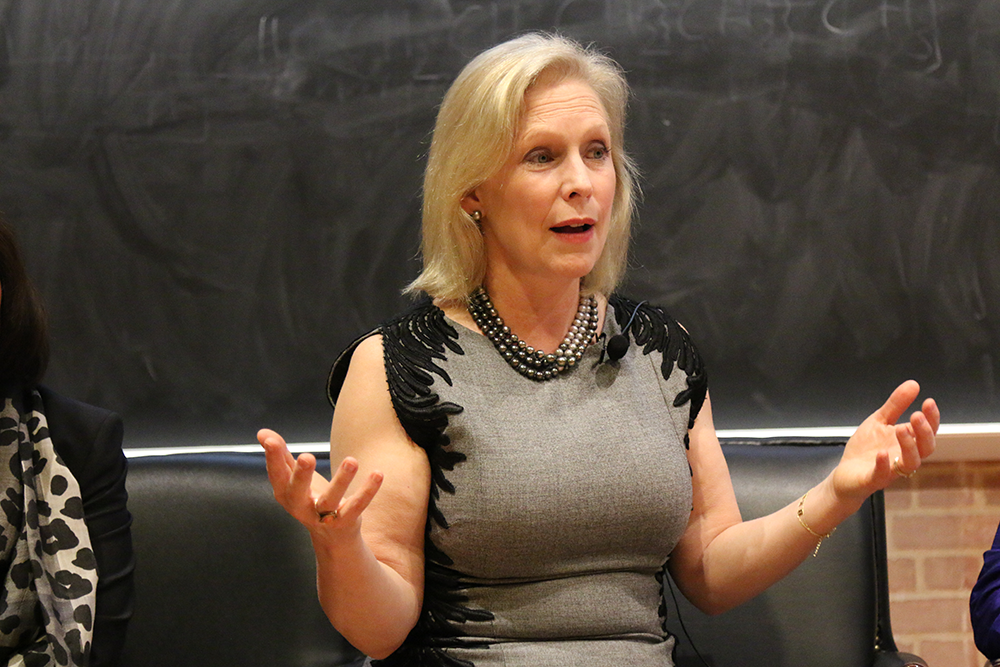Former presidential candidate Sen. Kirsten Gillibrand (D-N.Y.) emphasized the importance of diversifying political leaders and supporting legislation to ensure equality at an event in the Reiss Science Building on Oct. 30.

The event, titled “A Conversation with Senator Kirsten Gillibrand,” was presented by the department of women’s and gender studies, Georgetown University College Democrats, GU Women in Leadership and the GU Institute of Politics and Public Service. Donna Brazile, a political strategist who was the first African American woman to direct a major presidential campaign, and women’s and gender studies professor You-Me Park, moderated the event.
Gillibrand dropped out of the 2020 Democratic presidential nominee race two months ago after she failed to qualify for the third debate. Gillibrand was optimistic as she reflected on her failed presidential campaign, noting the importance of unifying Americans.
“I was not able to win the nomination, but I learned a lot and what I learned is that there is far more that binds us than what divides us,” Gillibrand said. “I will be able to bring those ideas back to the U.S. Senate, bring people together, get things done.”
Throughout the event, Gillibrand emphasized the need for greater diversity in American politics, with a focus on women’s representation. In 2012, Gillibrand founded Off The Sidelines, a leadership PAC that works to recruit, mentor and finance women to run for political office. The national program has raised nearly $5 million to provide women candidates with the resources they need to win, according to the organization’s website.
The gap between the number of male and female politicians is that women are often more hesitant to enter the field, Gillibrand said. This disparity means encouraging women to run for office is incredibly important, according to Gillibrand.
“What I’ve learned over time is what it takes is asking women to run, telling them your ideas and your values and your priorities matter,” Gillibrand said.
Though some see holding political office and balancing family demands as a barrier to being in office, these demands have allowed her to become a better advocate for her constituents, according to Gillibrand.
“A lot of times I get really angry or emotional or compassionate about an issue because I imagine it happening to my kids,” Gillibrand said. “It strengthens me, it makes me a better legislator and I think it creates more common ground with people in my state so I can represent everyone’s family as if they were my own.”
Gillibrand, who has been a member of Congress since 2007, faced barriers and discrimination as one of the few female freshmen members of Congress. Many of her male colleagues made comments about her appearance, her pregnancy and her exercise habits, according to Gillibrand.
“Women are really penalized. Whether someone is commenting on you favorably or negatively, it undermines you,” Gillibrand said. “Because when your looks are being commented on, then your ideas, policies and statements aren’t.”
Gillibrand said her mother’s role as an attorney for members of the gay community in her hometown of Albany, N.Y., inspired her to advocate for legislation for LGBTQ equality.
The senator worked heavily on repealing the military’s “Don’t Ask, Don’t Tell” policy, which was in place from 1994 through 2010 and barred openly gay individuals from serving in the armed forces but prevented discrimination against those who were closeted.
As one of the first statewide elected leaders in New York to support gay marriage, Gillibrand continues to fight for equality through her work on the Equality Act and the Violence Against Women Act. Both pieces of legislation have passed through the majority-Democrat House of Representatives but have been blocked in the Republican-controlled Senate. Gillibrand hopes to pass these bills by flipping the Senate to be majority Democrat in the 2020 election.
While Gillibrand has not endorsed a presidential candidate, Gillibrand plans to before the New York primary.
“I am very proud of my Democratic colleagues. I am very grateful that all of them feel that this is a mission and an urgency to run and to take on Trump,” Gillibrand said. “Obviously all of them are a billion times better than Trump, so whoever our nominee is, they will be someone I can support and help and really try to make sure they get elected.”
Gillibrand would strongly consider accepting a cabinet position if a Democrat wins the presidency, she said.
“I want to make a difference in people’s lives, and if I’m asked to serve in a different capacity than I have before, I will always consider it,” Gillibrand said.




















